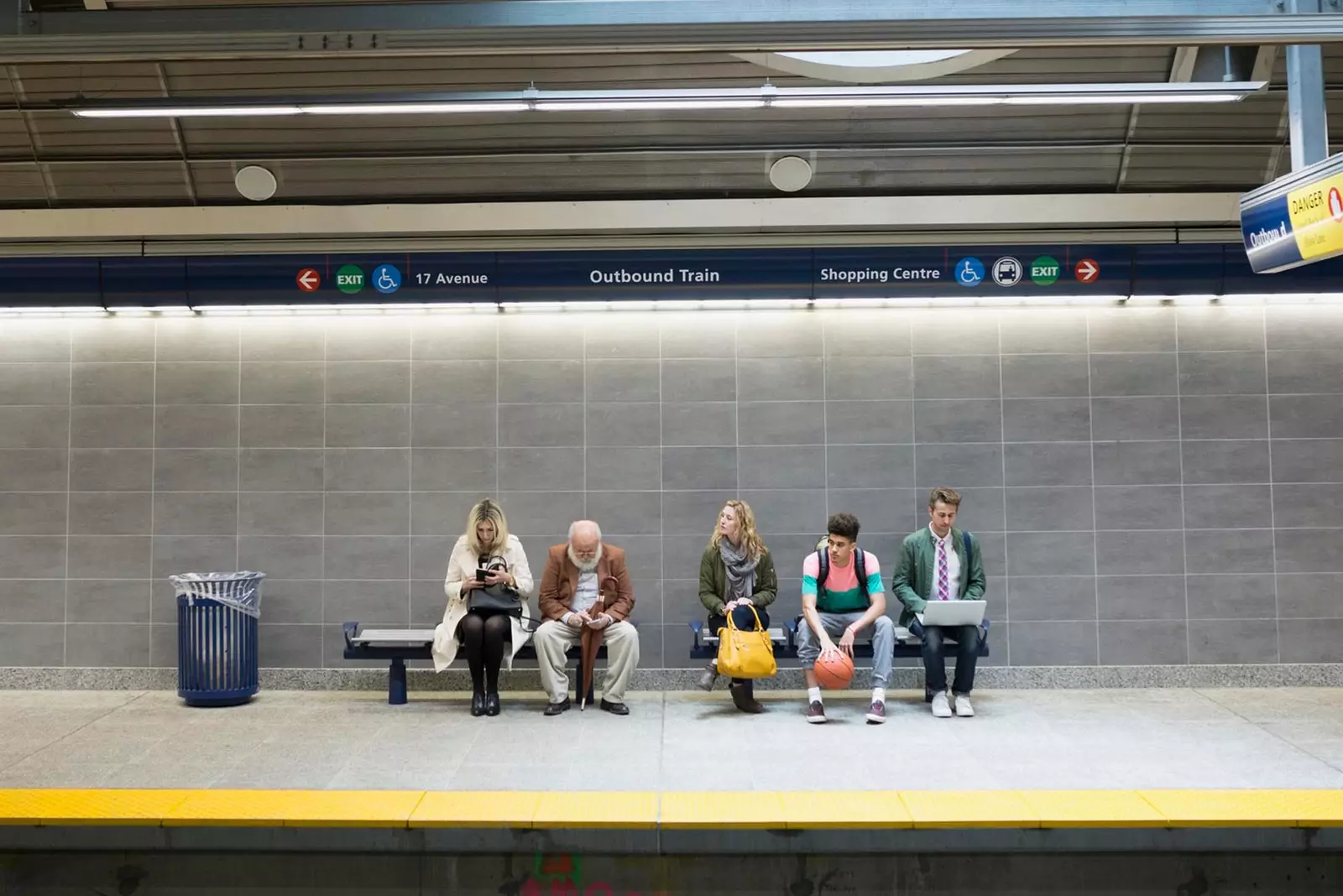
Interacting with strangers has more benefits than you think
I have a baby who, like all babies, loves to be listened to. He enters public transport looking for passengers who will laugh at him, namely: wave their hands dancing Five Little Wolves, pretend to call on the phone, offer them their drooling toys.
However, she is not always lucky, and she really gets desperate when she walks in and nobody looks at her because everyone is engrossed in their screen. I mean, she starts yelling at them, she gets in front of them, she pats them with her hand. Sometimes, even displaying all those charms, which are many, she doesn't get a look.
WHY DON'T WE CONNECT WITH THOSE NEXT TO US?
"I don't know exactly how it started, but I do know that new technologies, cultural change and changes in rhythm and lifestyle mutually influence each other so that interactions with strangers decrease more and more," says psychologist Alicia Gutierrez **. The reasons, for her, are several. On the one hand, she considers that our "dose of society" is already covered thanks to social networks; on the other, she points to simple laziness.

In reality we are constantly relating to each other... just not in an "analogical" way.
“Social relationships with strangers are a constant review : we do not know who we have in front of us, we do not know if it is a person with whom we fit in, we have to force ourselves to think of topics of conversation and check if that topic works or not, and if several of them do not work or are exhausted, we have to face to the tense silence of not knowing what else to say_",_ analyzes the expert.
Likewise, Gutiérrez affirms that “waiting time has become useful time”, because we are not only busier than before; In addition, we have the possibility of organizing some of our tasks from the mobile.
“While we are on the bus or in the waiting room we can also be shopping, organizing the agenda, working, checking emails, studying... Before, waiting time meant precisely that, she waits for her, a pause until something we want arrives and in which not much else can be done to wait looking at the wall or talking to the person next to you”, reflects the psychologist.
That same desire to take advantage of every minute of our lives does not help us to communicate with who we have next to us. Thus, as Gutiérrez states, it is much easier to start a social interaction with someone who is not doing anything than with someone who its busy with a book or, especially, with a mobile. "From a young age we are taught that interrupting is wrong, and we ourselves feel annoyed when someone interrupts us in the middle of something. By using the wait to do anything, we are creating an invisible barrier that says 'do not talk to me'.”

Who is involved in an activity is putting a barrier against the rest
All this, together with the type of life we lead -in blocks that do not facilitate the relationship with the neighbor, teleworking, etc- leads to the fact that we meet fewer and fewer people around us, according to Gutiérrez. This, in turn, means that it is less and less common to relate to who we have next to us. “And the less common it is, the more attention you draw if you do it,” the psychologist thinks.
“Before, the social norm in waiting was to strike up a conversation so that the wait was as pleasant as possible, the 'norm' was to bring up a topic to break the moment of silence. Due to the factors listed above, someone can now even feel weirded out, annoyed or invaded if a stranger talks to them, simply because the 'norm' has now changed."
So much so that those who still strike up conversations with strangers are usually older people. "They continue to internalize the norm of 'talking while waiting', they have less control over new technologies and have a calmer pace of life."

In front of a stranger you can be whoever you want to be
NOT TALKING TO THE ONE NEXT MAY BE REDUCING YOUR WELL-BEING
Gutiérrez accurately analyzes all the reasons why we no longer relate to the person next to us, even if they are literally attached to our skin. But does that have consequences for our emotional well-being?
“ Connecting with others increases our happiness , but two strangers next to each other routinely ignore each other. Why?” the researchers ask. Nicholas Epley and Juliana Schroeder , from the University of Chicago, in the study Mistakenly Seeking Solitude ("Wrongly Seeking Solitude"). “Two reasons seem likely: either solitude is a more positive experience than interacting with strangers, or people do not understand the consequences of social connections of this type ”, they continue.
To seek answers to these questions, they designed an experiment in which they instructed train and bus passengers to interact with whoever sat next to them, not to, or to act spontaneously, like any other day. “In both contexts, participants reported a more positive (and not less productive) experience when they related than when they didn't. Separately, participants from each context, however, expected precisely the opposite result, predicting a more positive experience in solitude."
“This mistaken preference for solitude is due in part to underestimating the interest of others in relating, which in turn prevents people from learning the real consequences of social interaction,” experts continue. And they add that "the pleasure of interacting seems contagious", because in another test, carried out in a waiting room, the participants who were instructed to talk to the rest reported experiences as positive as those to whom they spoke. . “Human beings are social animals. Those who do not understand the consequences of social interactions may not, at least in some contexts, be social enough for their own well-being." they conclude.
Gutiérrez agrees with this result: “ Social relationships are a very powerful reinforcer , just as it is a punishment to deprive ourselves of them, ”he explains. “The fact of interacting with strangers is stressful, but at the same time, if it goes well, it is an exchange of reinforcers in which we are constantly receiving and sending the other person. Simply, with which the other smiles at us, It already means something as powerful as 'I like what you say, I'm comfortable talking to you, you're funny...', and social acceptance is one of the most pleasant sensations we can receive”.
In fact, the psychologist compares social interactions with strangers with do sport: “It has many benefits that we all notice once we have done it, but you have to put yourself in, and taking the first step is the most complicated. Sometimes, the comfort of doing nothing wins, but we are all happy if, in the end, we manage to overcome that comfort and get into trouble”.
Likewise, Gutiérrez comes to the conclusion that precisely these fortuitous encounters can also be useful in terms of studies or work -she has experienced it herself, by striking up a conversation with the one who, without knowing it, would be her teacher-, and even result from the most pleasant: Interacting with strangers brings a certain freedom . The feeling that the person in front of you does not know you and probably will not see you again, allows you to be yourself, so you project a different security. To this is added that, if they do not know us, they have no information to judge us. Basically, interactions with strangers are an opportunity to show yourself how you want to be without fear of losing anything, ”she summarizes.
